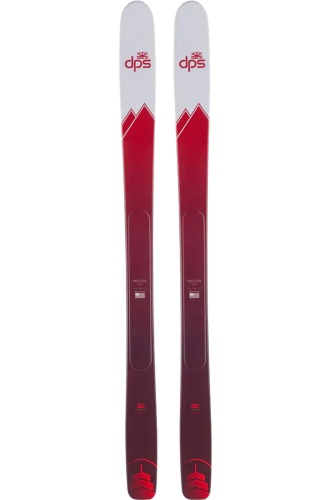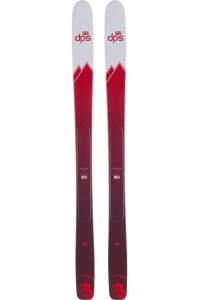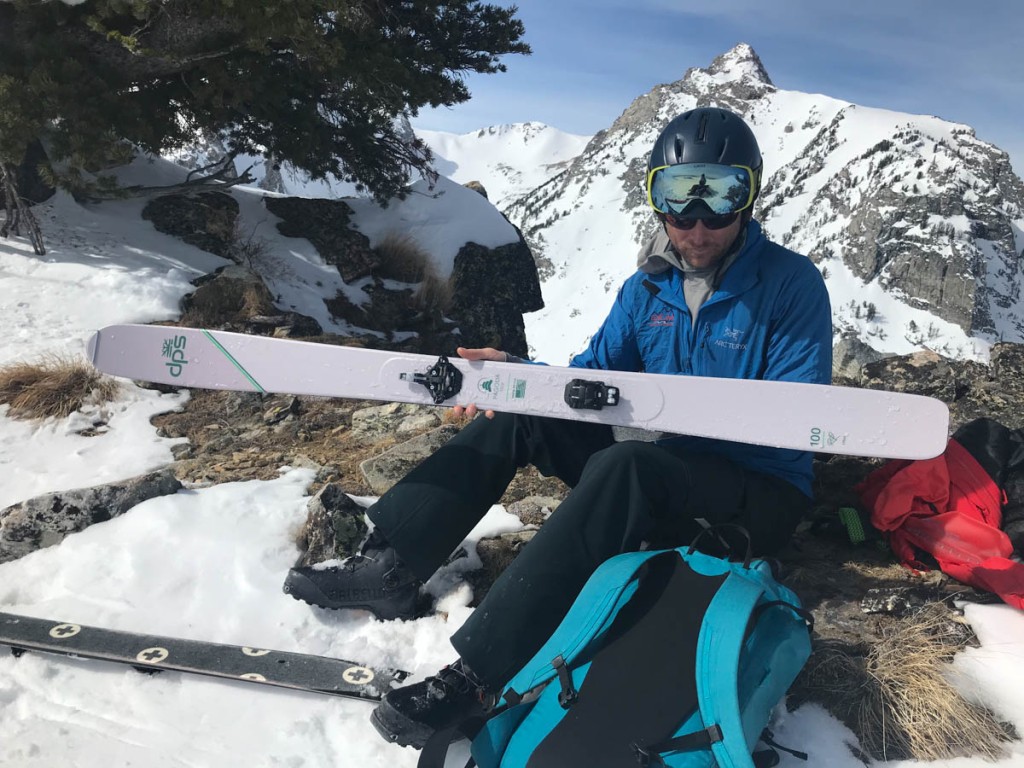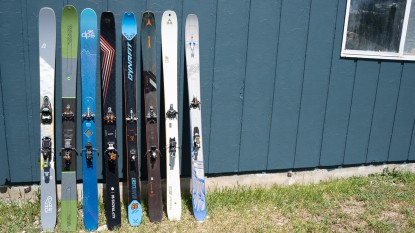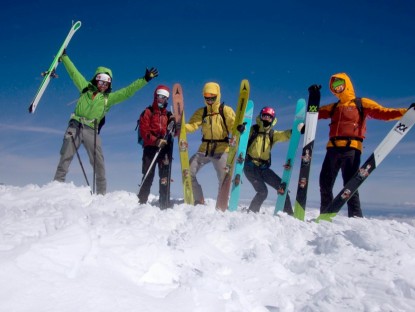DPS Pagoda Tour 100 RP Review
Our Verdict
Our Analysis and Test Results
The Pagoda Tour 100 RP has been updated since we tested it. The latest version uses DPS's new Third Rail technology, which incorporates additional sidewall material with the intent of increasing stability, dampening, and durability. The new ski is shown above (right), after the version we tested (left).
The DPS Pagoda Tour 100 is this now-established ski specialist company's latest “all around, all-mountain” touring ski entry. We liked it as a “quiver of one”, all-season stick for human-powered action of all types. Its downhill ski performance is balanced and adaptable to a range of ski styles, abilities, and conditions. The weight is competitive and represents a sort of “sweet spot” for human-powered access to all kinds of downhill skiing. This is a great ski model that competes with the best of the best in our test. It isn't quite as polished on the downhill as our top scorers in the weight class, and it isn't light enough to run with the uphill-oriented options.
Performance Comparison
Weight
We weighed each of our unmounted, fresh-out-of-the-plastic Pagoda Tour 100 skis on a calibrated, digital scale. We found them to weigh, respectively, 1589 and 1540 grams. That's an average of 1564g and a combined weight of 3129g. In imperial units, that converts to 6.9 pounds for the pair.
As compared to all the skis in our latest review roster, the Pagoda Tour 100 is just about average and middle of the pack. This is good. Around 1500-1600 grams is where we find the most popular, lasting, balanced ski options in recent years. At this weight point, you will find giant powder boards, skinny, stiff ski mountaineering specialists, and a whole host of all-around, all-season, all-skier touring skis. The Pagoda 100 is decidedly in this latter category.
Stability at Speed
We evaluate stability in speed and in steep terrain. Usually, there is a strong correlation between these two. Something stable at speed is also quite stable in steep terrain. And vice versa. Of course, there are subtle variations within our generalizations. This DPS downhill weakness is in stability at speed. Something about the construction (and, as we are inclined to do, we will refrain from trying to attribute specific downhill performance attributes to specific construction matters. Any attempt to do so is way more of a guess than other reviewers might like you to believe…) makes it wobbly and chattery, relative to its close competitors. It can still go fast, but it requires attention.
On the other hand, steep terrain stability is pretty confidence-inspiring. We liked these in truly steep terrain better than any other DPS skis we've used. These are great ski mountaineering skis for places where snowpack and institutional knowledge allow mid-winter steep skiing. We're looking at you, Tetons, Wasatch, and Chamonix…)
Firm Snow
The Pagoda Tour 100 can ski ice. We love it. Late winter of 2021 in our home testing range (Tetons) went “high and dry” for months. As a result, we skied firm snow more than we might otherwise expect. Our entire testing team regularly reached for the DPS Tour 100 for consequential, firm-snow tours. Again, as compared to other DPS skis we have tested over the years, the Pagoda Tour 100 is vastly superior. They seem to have cracked the code of hard-snow performance, and we like it. All-around performance has to include firm snow confidence. The Pagoda holds up.
Powder
You love powder skiing. We love powder skiing. The Pagoda 100 loves powder skiing. You will dig working with these on all but the deepest of days. Sure, 100 underfoot might sound small. And, yes, you can get skis that weigh the same or less with 2 centimeters more girth. If you have room in your life for dedicated, lightweight powder touring skis, get some. But, if you are more “normal” and want a simpler collection of skis, the Pagoda Tour 100 will keep up in everyone's favorite snow type. Geometry and flex characteristics combine to make them float when you need (except, as noted above, when it's nearly "too deep to ski") and navigate turns of various radii.
Crud/Poor Snow
You don't seek out poor snow. Nor do we. None of us like it, but all of us have to endure it. Thankfully, the Pagoda Tour 100 does more than endure. These are among the most forgiving skis for the weight that we have used. The Pagoda Tour is forgiving and predictable, whether in breakable crust, refrozen chop, or bottomless wet slop. You will have to adapt your technique. Everyone on every ski has to adapt. But these skis will enable more energetic, smooth turns in tougher snow than the typical product in this weight class. Yes, we keep qualifying by weight. Especially as it pertains to tough snow performance, weight is a performance attribute. Heavier skis will drive through the funk better than light skis, all else equal. Heavier materials further exaggerate this. Making light skis go well in tough snow is a tall order. DPS and others are getting better and better every ski generation, but they cannot transcend physics. Weight matters.
Value
You don't necessarily seek out the Pagoda Tour 100 for its value. DPS isn't known for making budget skis. The Pagoda line tops their scale in most ways. They are expensive at initial purchase. However, they are also quite versatile. Just five years ago, you would have had to own three pairs of skis to do what the Pagoda does on its own. In that way, you might justify the cost of the Pagoda. We've got one season on them with no durability concerns whatsoever. Past experience with the base material DPS uses suggests greater than average durability. The Pagoda core construction is new enough that we are reluctant to make a durability prediction. Instead, as we like to do, we will keep testing and report back after another season.
Conclusion
The DPS Pagoda Tour 100 joins a small, high-quality set of all-around skis for human-powered all-season backcountry skiing. The business keeps moving forward, and the close competition of the DPS Pagoda further moves the needle. These are great all-around backcountry skis.


